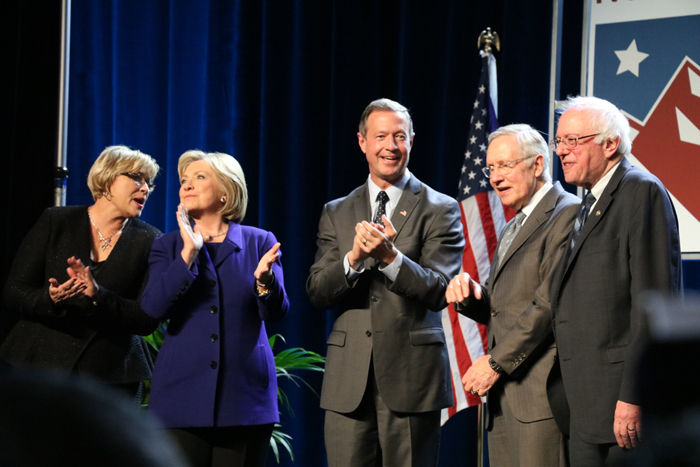The great debates
Hillary Clinton, Martin O’Malley and Bernie Sanders at a Democratic dinner party hosted by the Nevada State Democratic Party and Sen. Harry Reid Jan.6.
January 20, 2016
Iowa’s Feb. 1 caucus is rapidly approaching, and neither party can truly predict the winner of the upcoming nomination. The only thing currently apparent to voters is the widening divide between two polarized political parties.
With only three days separating the most recent Republican and Democratic debates, voters had the closest juxtaposition between the two parties than they will until the general election. As the primaries come to a head, these debates show the voting public the cracks from within each party before hoisting two champions to do battle between the aisles.
During Thursday’s Republican debate, candidates obviously felt the chance to plant or supplant waning. Even Trump felt the results of tightening polls, attacking the runner-up Senator Ted Cruz’s status as a natural born citizen.
When pressed by a moderator as to why Trump had begun this line of attack against Cruz, he replied, “Because now he’s doing a little bit better.”
Once the runner-up, Dr. Ben Carson attempted to solidify his standing by demonstrating his grasp of foreign affairs, but though he named key cities in the region, he completely misunderstands the dynamic of a war fueled by unhinged western retaliation.
Instead he called to “untie the hands of the military,” a strangely veiled way of saying that civilian casualties should not be factored into the cost of war. This sentiment was echoed throughout by anyone called on while the topic was relevant.
This is not new in Republican debates, particularly when directed to their own constituency, but those who’ve watched the entire debate cycle up to this point can see the clear magnifying effects of Donald Trump on rhetoric. He took his allotted time to double-down on threats to the families of terrorists, the border with Mexico and the entire Muslim world.
This has proven popular, and candidates are left with the choice of either wresting the reigns back for establishment Republicans — Marco Rubio, Jeb Bush — or outpacing Trump in waving the American stick around — Chris Christie, Ben Carson, Ted Cruz.
As it becomes more likely that Jeb will not be president, his nervous voice has become more reasonable amongst people who understand the difference between Muslims and terrorists. Everyone on the stage but Bush — and maybe Rubio — sounded like they want to divide Africa and Eastern Europe with one large crater.
Referring to Donald Trump’s threat to bar all Muslims from entering the country if elected, Bush played to what seems to be his only current role of marginalizing Trump.
“Sending that signal makes it impossible for us to be serious about taking out ISIS and restoring democracy in Syria,” Bush said at Thursday’s debate.
While the Republican field tried to stump the Trump, Hillary Clinton tried to use Sunday’s debate to put a stop to Senator Bernie Sanders’ momentum. Viewers who have paid close attention to the political field — particularly Republican viewers — have seen the swing leftward of Democratic presidential candidates, as Sanders’ popularity threatens Clinton’s steady rise to the throne, as many in the Republican field have framed it. O’Malley was also there at Sunday’s debate, still trying to swat at Clinton until she offers up a cabinet position.
The atmosphere was different at the most recent Democratic debate. Sanders changed his policies on gun control and health care reform the night before the debate, and though the change aligned Sanders more closely with Clinton, she still criticized his single-payer health care plan as threatening to dismantle Obamacare. Clinton also used the shift in policy from Sanders to declare herself the more consistently liberal candidate, which has been a contentious point for Clinton among Sander’s supporters.
Sanders gave no quarter in retaliation.
“No one is tearing (Obamacare) up, we’re moving forward,” Sanders said at Sunday’s debate.
The up-and-coming Democratic candidate pulled no punches of his own, attempting to draw contrast between himself and Clinton.
“I don’t take money from big banks,” Sanders said. “I don’t get personal speaking fees at Goldman Sachs.”
Clinton responded by framing herself as Obama’s natural successor, criticizing Sanders for not being able to compromise with Wall Street in order to achieve reform. O’Malley seized this moment, drawing parallels to Clinton’s rhetorical use of 9-11 in the second Democratic debate to fend off similar attacks.
“Now you bring up President Obama here in South Carolina in defense of your cozy relationship with Wall Street,” O’Malley said.
This comes at a time where Sanders is starting to overtake Clinton in both Iowa and New Hampshire, key early-caucus states.
In many ways, primary elections are more honest. Rather than trying to pull a bait-and-switch on the country as a whole, viewers can see candidates as they want to be represented amongst their constituency.
This also means pulling toward the most popular direction of that constituency, as demonstrated by the polarizing effects of demagogues such as Sanders and Trump. Whatever they may be as politicians and as people, their effects on partisan politics has a similar gravity.





















